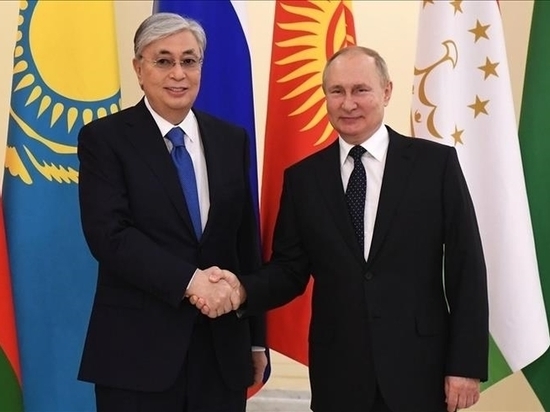Kazakhstan took advantage of anti-Russian sanctions to increase oil exports through Moscow pipes
[ad_1]

Astana works primarily on its own economic benefit
Western sanctions, limiting the cost of Russian hydrocarbons to a minimum, are pushing other supplier countries to take advantage of an unexpected chance to conquer new segments of the energy market. This fully applies to our neighbor – “friendly” Kazakhstan, which willingly refuses oil cooperation with Moscow and gladly increases the supply of its raw materials to European consumers – instead of Russian ones.
Kazakhstan increased its oil exports last year, bypassing Russia, Reuters calculated. Most of the Kazakh oil that does not cross Russian territory was imported to China.
Deliveries of raw materials through the channels of the Caspian Pipeline Consortium (CPC), the main export oil route of Kazakhstan, amounted to at least 80% of the total foreign sales of the republic’s “black gold” last year, according to Reuters estimates. Whether this is a lot or a little depends on the point of view: about 1% of the world’s oil supply is supplied through the CPC.
Since Kazakhstan does not have access to the sea, the export of energy resources from this producing country is traditionally carried out through the Russian provinces through the transport facilities of the Caspian consortium. Its main shareholders are Russia’s Transneft, which owns 24% of the company’s shares, and Kazakhstan’s KazMunayGas, which owns 19% of CPC’s securities. The Tengiz-Novorossiysk pipeline, whose length exceeds 1.5 thousand kilometers, annually supplies more than two-thirds of all Kazakhstan’s export oil, as well as raw materials from Russian fields, including those located in the Caspian Sea.
Last year, deliveries through the CPC, albeit slightly, decreased, not exceeding 52 million tons. At the same time, along routes bypassing Russia, 1.26 million tons were delivered to China, 214 thousand tons were sent through the Georgian port of Batumi, 141 thousand tons were sent to an oil refinery in Baku, 109 thousand tons were delivered to the Baku-Tbilisi pipeline. Ceyhan and 80 thousand tons – to Uzbekistan. In total, according to Reuters estimates, 1.8 million tons of oil (36 thousand barrels per day) were exported bypassing Russia. This figure has almost tripled compared to 2021.
“The volume of increased deliveries bypassing Russia cannot harm our country in any way. Additional shipments barely exceed 35 thousand barrels per day – that is, one tanker is not the largest, ”says Sergey Suverov, investment strategist at Arikapital Management Company. According to him, the CPC was supposed to bring income to its owners and was never considered as an “energy lever” of the Kremlin, with the help of which it would be possible to create a fuel shortage in the Western market if the opportunity arises.
“Investors were going to receive dividends for their investments, implying no political overtones. Under the current conditions, CPC shareholders, including countries that are unfriendly to Moscow, are capable of ignoring exclusively investment tasks or even selling their stakes to Asian corporations that are calm about Russia. They are only interested in stable volumes of oil, albeit at an increased price,” Suverov believes.
“Since CPC is co-owned by companies from countries that impose economic sanctions on Russia, in particular from the United States, Britain and Italy, Moscow’s attitude towards this project is becoming more intense,” says Igor Yushkov, an expert at the National Energy Security Fund. Previously, domestic officials could turn a blind eye to some “excesses” of Kazakh suppliers and not particularly strictly monitor the export route of Kazakhstan, the expert believes. But in the current circumstances, connected with the desire of the West to regulate Russian export prices, our departments will be extremely meticulous in assessing the work of the CPC: if there are any inconsistencies, including those related to the volume of export deliveries, the regulators will act to the fullest extent of the law. Supply restrictions are not excluded, Yushkov warns.
If Kazakhstan intends to completely bypass Russian transport hubs, then, theoretically, Astana will be able to continue to increase the transshipment of raw materials to the Central Asian countries, which are ready to pay the “double tariff” – exchange quotations for hydrocarbons in the East are almost twice as high as European market marks. Only in this case it will be easy to run into pitfalls. “Oil is usually paid for already pumped into tankers,” Suverov notes. – For the risk of supply disruption, you have to increase the cost of the contract. Logistics will grow exponentially. Even the existing high prices for hydrocarbons will not be able to ensure the profitability of such exports. Someone has to lose money. Considering that Western companies are CPC shareholders, by attacking the export of Russian energy resources with new sanctions, Europe is hitting its own pocket. Yes, the supply of Kazakh raw materials to the Chinese market will increase and Russian exporters will lose profits. However, European hydrocarbon exporters will not gain anything from this: on the contrary, their incomes due to anti-Russian sanctions will decline.”
[ad_2]
Source link






